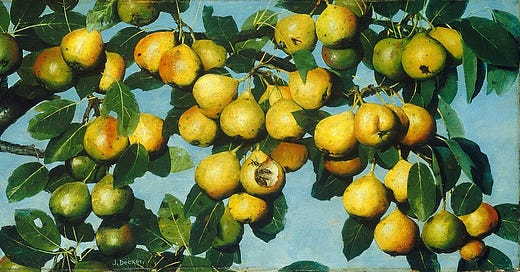[Image: Joseph Decker, “Ripening Pears,” c. 1884/85, courtesy National Gallery of Art, gift of Ann & Mark Kington / the Kington Foundation & the Avalon Fund. Public domain. Also of course the cover image for Fragile Objects, that new story collection that for some reason seems to be all over your notifications, or maybe that’s just my notifications. Probably just mine.]
A fleeting thought today, occasioned by this piece by poet Carla Galdo at Front Porch Republic: I have often wondered why sense of place seems to matter so much to writers and have landed on the thought that place, like physical body and like literary form itself, is mainly limitation: and as Flannery O’Connor noticed, “the shape of our limitations is the shape of our gift.”
But this has to mean something more than its merely restrictive implications, and Carla sets us on the road toward seeing exactly what. She develops far more deeply and fully this connection of local habitation to fruitfulness itself, which I also touch on lightly in Seth Wieck’s interview with me that also appeared this week in FPR. “Constraint is generative” is a phrase we’re all familiar with by now, thanks to poet A.M. Juster; he typically means constraint in the sense of literary form, but now Carla has me wondering if creative originality, to the limited extent any such thing exists, can be linked in some way to the constraint of origin, in the literal sense of where you come from, as well as in the metaphorical sense of where you find exemplars for your work.
As I say in the interview, this was an uncomfortable thought for me for quite some time, in large part because I come from such a troubled place and have a not untroubled relationship to it:
But I’ve slowly come around to the thought that it’s in attending to limitation that we come to see human choice, and therefore character, most compellingly. For me, where a story unfolds directly influences how it unfolds. This is true both in life and in fiction: Possibility is both a function of character agency and of physical, aesthetic, natural, and social environments—neither overriding or fully controlling the other, both working in relationship. It’s in that tension that the most exciting, the most human events and choices and chains of causality happen—those that can never be reduced to type or fully, satisfactorily explained in material terms.
Like a physical birthplace, a tradition—whether artistic, spiritual, intellectual, or what have you—has its own topography. It too has to be fully learned before it can ever be authentically challenged, questioned, abandoned—or, alternatively, chosen. How fortunate we are when we’ve found a place where we can finally, even if temporarily, persuade a little something of our own to grow.





I've thought a lot about sense of place in literature and my conclusion is that it comes down to establishing the locus of love. Love is an essential element of story. Without love, there is no desire and without desire there is no striving, and without striving there is no drama. The first job of the author, then, is to establish what their characters love. That is not always place, but because so many stories involve journeys -- how many desires can be satisfied without a journey? -- leaving home is very common in stories, and what is poignant or dramatic about leaving home unless home is the locus of love?
Thus we see an extraordinary love of of place in writers like Steinbeck and Tolkien who begin with loving hymns to Monterey or The Shire. We can also see an extraordinary love of adopted places, like Brideshead, for Charles Ryder (in contrast to his unbearable home). It is not universal. There is not much love of place in Jane Austen. But that is because the locus of love is elsewhere.
Not every quest requires a journey, or at least, not an arduous one. But because desire so often forces one to journey, it so often makes dramatic sense to make setting the locus of love, and for that the writer must give the reader a strong sense of place and of a character's affection for that place. Indeed, I would suggest that "strong" in the phrase "strong sense of place" is entirely about love. It is love that make the sense of place, or indeed the sense of anything else, strong.
Katy, first, thank you for your kind and gracious attention to my little article. Second, a rousing YES to your line that "a tradition—whether artistic, spiritual, intellectual, or what have you—has its own topography". I think I turned a corner when I realized this. There can be a bit of...not sure how to say it, but perhaps inordinate attachment, to one particular idea of place, land, origin, tradition, which I myself have certainly been guilty of. For me it was a bit of a distraction, directing attention only to what I thought I didn't have, or ought to have had, etc. Everyone has spaces like this, I suppose.